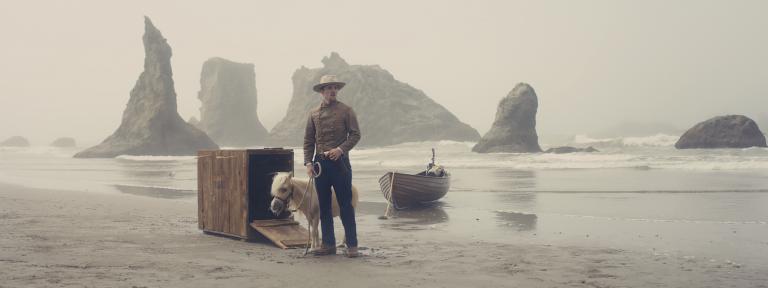The strange, sometimes wonderful Western, Damsel, is full of surprises. That’s both a strength for those looking for something fresh and unpredictable and a drawback for those who appreciate more familiar genre tropes. An often-goofy film with serious undertones, Damsel, from the Zellner brothers, feels like the best movie another filmmaking team of brothers, Joel and Ethan Coen, never made.

Damsel isn’t the first time a Zellner film has nodded toward the work of the better-known filmmaker-brothers duo. The Zellners’ previous effort, Kumiko, the Treasure Hunter, was set in the U.S. Upper Midwest and featured a protagonist on a treasure hunt inspired, in part, by the Coens’ movie Fargo. Damsel features a hunt of a different sort, as Henry, a parson, is enlisted by Samuel Alabaster (Robert Pattinson) to travel with him in the American Frontier of the 1800s to his beloved, Penelope (Mia Wasikowska), whom he wants to wed.
Things don’t go as planned, largely because Samuel isn’t being entirely open. He gradually reveals that Penelope has been kidnapped and that, as Samuel tells Henry, he plans to “rescue [her] and marry her proper.” But once we meet Penelope, we learn that the situation isn’t as cut-and-dried as Samuel has made it out to be.
Much of the pleasure of Damsel, beyond its performances, is in its pleasantly arresting images. Among them:
-A pastor who, in the film’s opening scene, meets Henry. The latter is looking for a fresh start after the death of his wife during childbirth. The former is heading back home, having given up on his plan to bring Christianity to “the savages.” “They don’t want it,” he explains to Henry, as he hands Henry a Bible. “I hate to break it to you, but it ain’t gonna be better out here.” The West, he says, “is shi–y in new and fascinating ways.”
-Early in the film, Samuel rows ashore (in a location that’s never specified) in a boat that contains a large shipping box. The box is opened to reveal a miniature horse named Butterscotch—a gift for Penelope once the couple is reunited.
-A collection of interesting faces among characters that populate the film in minor roles—another way Damsel resembles the Coens’ work.
-A man with no hands who plays the harpsichord using only the stumps of his arms.
-A man covered with crabs, lying on a beach.
The film’s biggest surprise comes later, with the reaction of Penelope once Samuel and Henry locate her—a sharp turn in a story that retains the Zellners’ offbeat sense of humor while simultaneously becoming grimmer, even bloody. What had early on seemed playful becomes weightier in its examination of the line between hope and delusion, and in its female character’s assertiveness and authority in comparison with the vacillating, unsure-of-himself Henry, and Samuel, who can see only the version of reality he’s constructed.
The movie’s view of faith and the afterlife is dim at best. The fleeing pastor’s cynical remarks in the film’s opening sequence are never shown to be anything less than justified, and characters’ assertions about the eternal destiny of others, while generating sympathy for those who grieve, are based on notions of “good” that have no biblical grounding. When we do see a Bible, it’s tattered and missing several pages, its pages useful for nothing more than as a receptacle when Henry blows his nose.
When a character says, close to the film’s conclusion, “I don’t need anybody’s saving!” the implications go beyond that character’s physical well-being. Damsel is a fierce rejection of those who think they can save others from both human predation and divine wrath. If you don’t expect theological soundness in Damsel but can appreciate a cold, sometimes nasty revelation about humans’ capacity to deceive themselves, you may find edification where the film seems to want only to generate a snicker.










